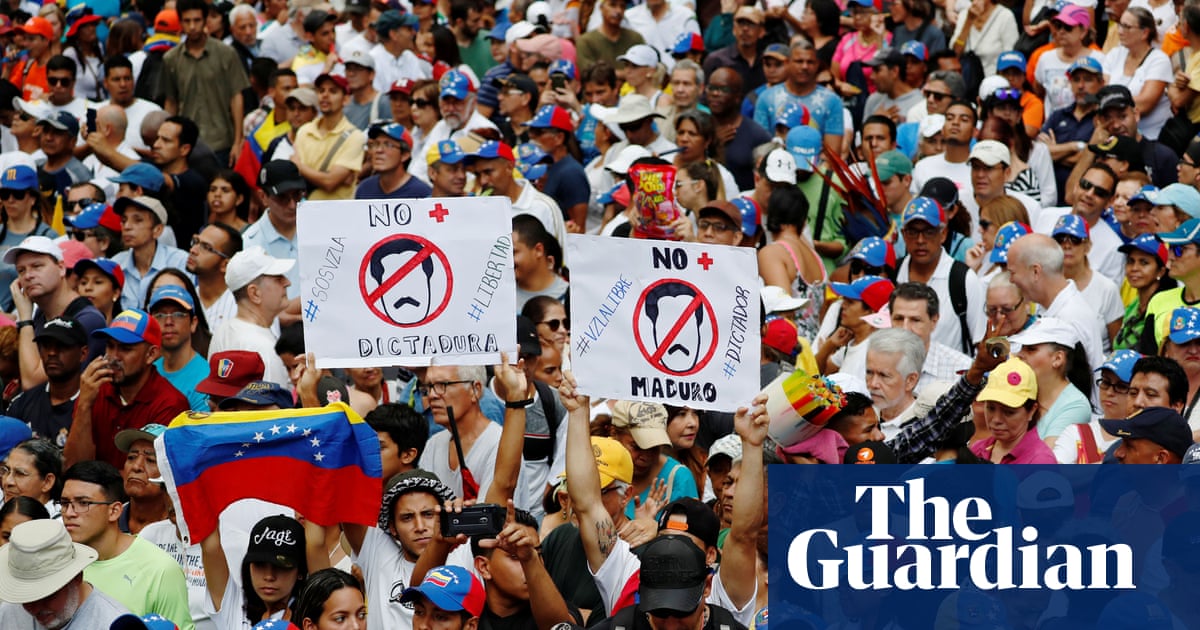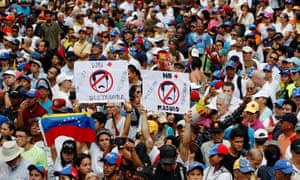Venezuela’s flagging opposition movement has hit the streets for its first major protests in months, as leaders sought to reignite their campaign to force Nicolás Maduro from power after his leftist ally Evo Morales was toppled in Bolivia.
Thousands of protesters took to the streets on Saturday morning in towns and cities across the crisis-stricken south American country, hoping the dramatic sea change in Bolivian politics might portend similar change in Venezuela.
“The whole of Venezuela awakes,” the movement’s young leader Juan Guaidó said in a Twitter message to demonstrators who had gathered in cities including Maracaibo, Barquisimeto and the capital, Caracas.
Maduro supporters staged a rival demonstration in Caracas to denounce what organisers called “US coup-mongering in Bolivia and Venezuela”.

Political career
Nicolás Maduro has ruled Venezuela without two of the greatest assets possessed by his mentor and predecessor, Hugo Chávez. He has not been lucky. And he has no charisma.
Chávez enjoyed an oil bounty and sublime political talents that secured his power at home and reputation abroad.
Maduro, in contrast, inherited a wobbling economy addicted to high oil prices and a system of authoritarian populism dependent on showmanship and patronage. Oil prices tumbled and Maduro proved to be a fumbling showman, exposing the financial ineptitude and ideological hollowness of the “Bolivarian revolution”.
This could have doomed his presidency, which began in 2013 after Chávez died, but the former bus driver, a hulking bear of a man who rose up trade union ranks, turned out to be tenacious and ruthless.
Born into a working class family in Caracas in 1962, he left school without graduating and drove buses for the Caracas metro. He became a union organiser and early supporter of Chávez, who, after leading a failed coup, led a leftwing coalition to an electoral landslide in 1998.
Maduro was the speaker of the assembly before serving as Chávez’s foreign minister from 2006 to 2013, a visible if largely silent presence as the comandante held court on the world stage. Chávez anointed Maduro as his heir before succumbing to cancer.
The story of his rule – and Venezuela’s agony – is a determination to keep power amid economic collapse, humanitarian disaster and international condemnation. Since January 2019 his presidency has been disputed, with Juan Guaidó being sworn in as interim president, and recognised as Venezuela’s ruler by some international powers.
Crisis after crisis has buffeted his government – hyperinflation, food and medicine shortages, power blackouts, mass protests, drone attacks, defections, US-led sanctions – and Maduro has remained standing, resolute, implacable.
It is a remarkable position for a man who, in a 2014 Guardian interview, described himself as a bit of a hippy and a fan of Led Zeppelin and John Lennon.
“I never aspired to be president,” he said. “I always honour something that commander Chávez told us: that while we were in these posts we must be clothed in humility and understand that we are here to protect the man and woman of the streets.”
Anti-Maduro demonstrators chanted “Freedom! Freedom! Freedom!” as they processed through Caracas carrying their country’s yellow, red and blue tricolor flag.
“The dictatorship is mistaken if it thinks we are afraid,” Hayber Farias, a youth leader from Guaidó’s party, said as he joined the demonstration.
Guaidó lead supporters to the Bolivian embassy in Caracas and insisted: “I don’t know if it will be today, tomorrow or Monday. But what I can guarantee you .... is that we will have freedom in all of Venezuela.”
But Guaidó’s campaign has lost steam since the start of this year when Maduro’s downfall seemed to many a matter of time and Saturday’s marches appeared far smaller than the massive mobilisations that rocked Venezuela in January, February and March.
One veteran of those protests said they had decided to stay at home on Saturday: “It sounded pointless.”
Since Guaidó’s failed attempt to spark an uprising on 30 April momentum has ebbed away from his movement and international attention – and support – has fallen away.
The left’s recent return to power in Argentina robbed Venezuela’s opposition of one important regional ally, Mauricio Macri, although Guaidó continues to enjoy the backing of Brazil’s far-right president Jair Bolsonaro, Colombia’s Iván Duque, as well as the US and European powers such as the UK and Germany.
Many key members of Venezuela’s opposition have also been forced to flee into exile amid a crackdown that began after the botched attempt to bring Maduro down on 30 April.
Raúl Gallegos, a Venezuela specialist from the Control Risks consultancy, said Saturday’s demonstrations were designed to signal both at home and abroad that Guaidó’s crusade against Maduro was “alive and well”.
“Everything that is happening in Latin America has made it very clear that Venezuela has lost its pre-eminence in the news cycle. And with the departure of Evo Morales they are trying to take advantage of that momentum and say: ‘Maybe we are the next Bolivia.’”
Gallegos said that kind of rapid change seemed improbable in Venezuela – but with its economy in ruins and international pressure unlikely to ease in the immediate future, the situation remained unpredictable.
“When a regime is holding on through fear and intimidation … it entails a number of risks and vulnerabilities for those in power. So the idea that this is over – I wouldn’t be so quick to call it that way,” Gallegos added.
“It’s still a climate that lends itself to unexpected events that could lead to a successful coup or the emergence of a new type of leadership within the opposition … that could be much more radical in its approach towards the government.”

